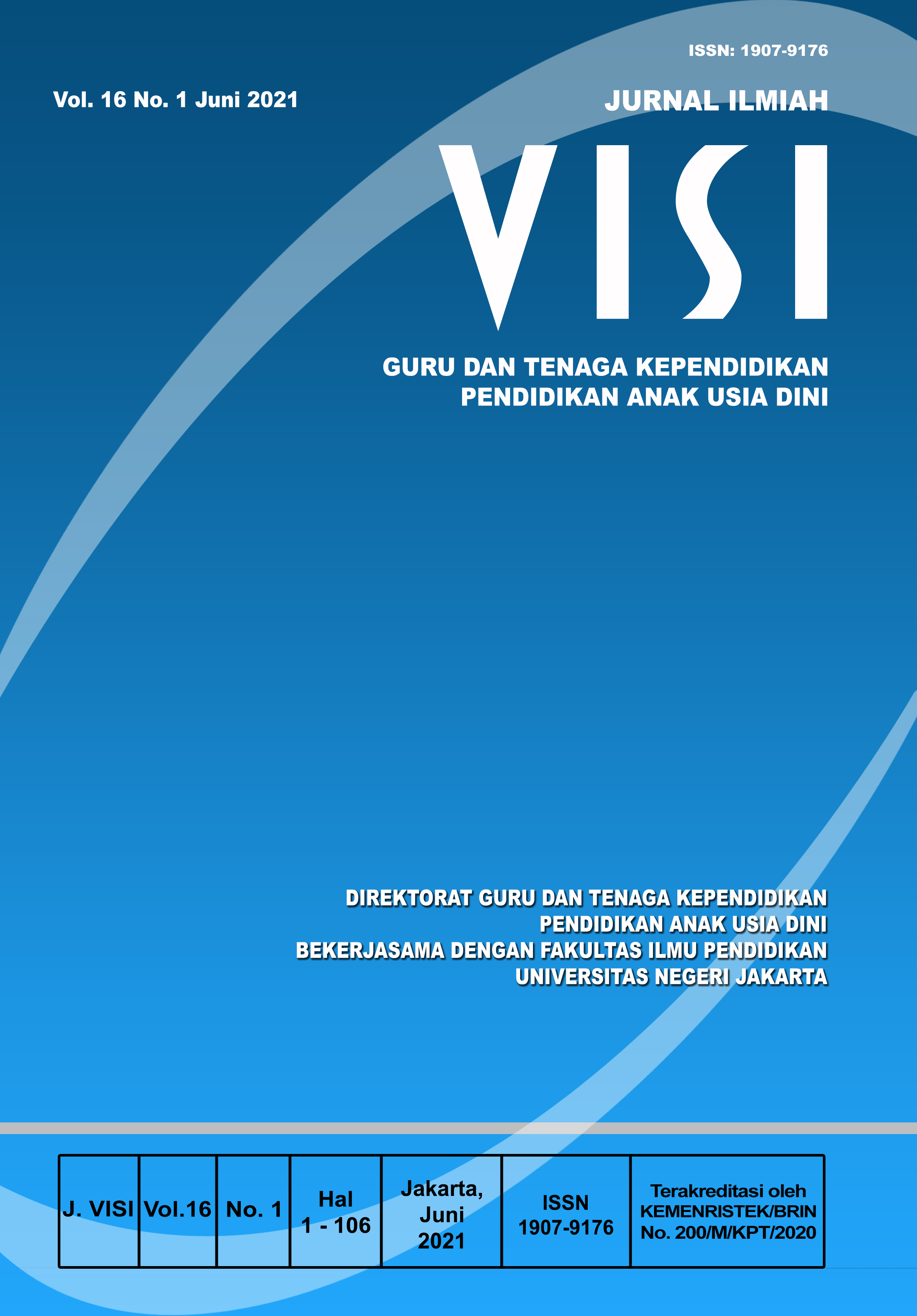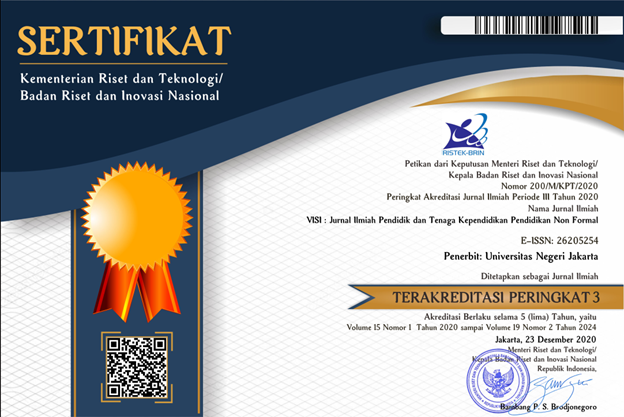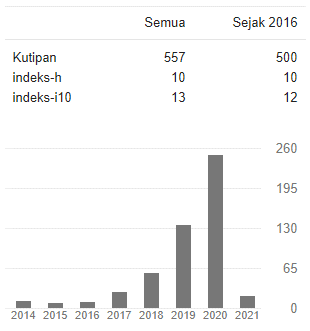ANALISIS PEMBELAJARAN ROHANI ANAK PRASEKOLAH BERBASIS DARING DI MASA PANDEMIK COVID-19
ANALYSIS OF THE ONLINE SPIRITUAL LEARNING OF PRE-SCHOOL CHILDREN IN THE PANDEMIC TIME OF COVID-19
DOI:
https://doi.org/10.21009/JIV.1601.4Keywords:
anak usia dini, daring, pandemik COVID-19, pembelajaran rohani, COVID-19 pandemic, early childhood, online, spiritual learnngAbstract
Penelitian ini dilatar belakangi oleh adanya kebijakan baru tentang pelaksanaan Belajar dari Rumah (BDR) di masa pandemik COVID-19 yang mengutamakan keselamatan dan kesehatan peserta didik dan pengelola di lembaga PAUD. Kondisi ini berimplikasi pada pembelajaran kerohanian PAUD di mana seharusnya dilaksanakan dengan tatap muka. Tujuan penelitian ini untuk mengetahui informasi edukasi rohani anak prasekolah dalam jaringan yang mencangkup proses pembelajaran hingga penilaian guru terhadap pembelajaran selama masa pandemik. Pendekatan kualitatif digunakan untuk menggali data melalui wawancara dan dokumentasi terhadap pelaksanaan pembelajaran rohani anak. Penelitian dilakukan pada sebuah Taman Kanak Kanak (TK) di Kota Yogyakarta dengan karakter keberagamaan agama. Partisipan penelitian adalah guru dan kepala sekolah. Hasil penelitian menunjukkan bahwa pelaksanaan pembelajaran rohani anak usia dini sesuai dengan Kurikulum 2013 selama sistem pembelajaran dalam jaringan. Pembelajaran dilaksanakan melalui pemberian tugas melalui panduan belajar anak selama satu minggu yang dikirimkan melalui media aplikasi Whatsapp Group orangtua siswa. Adapun materi pembelajaran rohani disesuaikan dengan agama masing-masing anak. Orangtua memandu anak dalam kegiatan rohani kemudian mendokumentasikan hasil belajar anak dalam bentuk video maupun foto. Evaluasi menunjukkan bahwa proses pembelajaran kurang efektif, karena minimnya kapasitas guru dan kurang optimal dalam memantau dan membimbing anak secara langsung ketika proses pembelajaran rohani. Hasil yang didapat adalah adanya sebagian anak yang kurang maksimal dalam mengikuti proses pembelajaran, sehingga hal ini berakibat pada penurunan penilaian pembelajaran rohani di lembaga PAUD.
This research was motivated by the existence of a new policy on the implementation of Learning from Home (BDR) during the COVID-19 pandemic which prioritized the safety and health of students and all levels of educators at early childhood institutions. This condition has implications for such institutions, especially in early childhood spiritual education which should also be conducted online. This is a case study which aims to explore the online spiritual education for preschool children that covers the learning process and the teacher's assessment of learning during the pandemic. Qualitative approach was used to gather the information through interviews to teachers and headmasters and documentation on the implementation of children's online spiritual learning at TK Omah Dolanan Yogyakarta. The results show that the implementation of early childhood spiritual learning in this institution is in accordance with the 2013 curriculum during the online learning system. Learning is carried out through giving assignments in the form of broncasthing or children's study guides for one week which are sent through the WhastApp Group application media. The spiritual learning material is adjusted to the religion of each child. Parent guide children in spiritual activities then document their learning outcomes in the form of videos and pictures. The evaluation is not effective in the learning process, namely the lack of teacher capacity and the inadequacy in monitoring and guiding children during the spiritual learning process. Some children were not participating maximally in the learning process, so this resulted in a decrease in the assessment of spiritual learning in this early childhood institutions.
Downloads
Published
How to Cite
Issue
Section
License
Authors who publish with this Journal agree to the following terms:
- Author retain copyright and grant the journal right of first publication with the work simultaneously licensed under a creative commons attribution licensethat allow others to share the work within an acknowledgement of the work’s authorship and initial publication of this journal.
- Authors are able to enter into separate, additional contractual arrangementfor the non-exclusive distribution of the journal’s published version of the work (e.g. acknowledgement of its initial publication in this journal).
- Authors are permitted and encouraged to post their work online(e.g. in institutional repositories or on their websites) prior to and during the submission process, as it can lead to productive exchanges, as well as earlier and greater citation of published works.
- Users/public use of this website will be licensed to CC BY-NC-SA Creative Commons Attribution-NonCommercial-ShareAlike 4.0 International License









